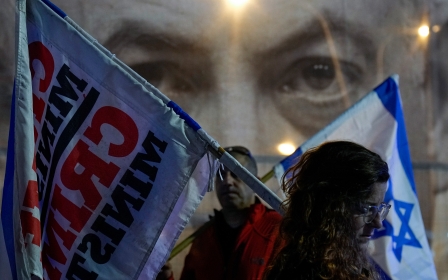Israel is seeking to deport citizens and residents. Here’s what you need to know

Israel is in the process of approving legislation allowing it to revoke citizenship or residency from those who have committed “acts of terror”, and deport them to occupied Palestine.
Last week, the Knesset passed the first reading of a bill that stipulates that those sentenced to prison on offences that breach “trust to the State of Israel” and have received a form of funding from the Palestinian Authority (PA) can have their citizenship or residency revoked and be deported to the occupied West Bank or the besieged Gaza Strip.
It will apply to both Palestinian citizens of Israel and permanent residents of Jerusalem, and is being fast-tracked through parliament following an escalation of violence in recent months.
The bill has earned widespread support from both the new far-right government and opposition parties, with the first reading approved by 89 parliamentarians and opposed by only eight.
The proposed law posits that an Israeli citizen or resident who receives “monthly salaries from the Palestinian Authority as wages and compensation for committing acts of terrorism” is tantamount to “an admission that he has relinquished his standing as a citizen or resident”.
Stay informed with MEE's newsletters
Sign up to get the latest alerts, insights and analysis, starting with Turkey Unpacked
The PA has long claimed that payments to the families of prisoners are a form of welfare to those who have lost their breadwinner, and denies the funds seek to encourage violence.
The new legislation has been criticised by rights organisations and legal experts, who maintain it exclusively targets Palestinians on the basis of racial identity and contravenes international law.
Middle East Eye breaks down the history of Israeli authorities revoking citizenship and residency from Palestinians in Israel and occupied Jerusalem, and the legal ramifications of the new bill.
History of revoking citizenship
Israel already has existing legislation allowing it to revoke citizenship or residency. This new bill, however, marks the first time it will seek to subsequently deport people to occupied territory.
“In 2008, Israeli law was amended to allow the minister of interior to revoke citizenship based on loyalty (or the perceived lack of which),” Hassan Ben Imran, a Nairobi-based board member at Law for Palestine, told MEE.
“The first incident came in 2017 when an Israeli court ruled in favour of revoking the citizenship of a Palestinian citizen of Israel on the basis of loyalty.”
In August 2017, a court in Haifa approved a request by then interior minister, Aryeh Deri, to revoke the citizenship of Alaa Zayoud, a longtime Palestinian prisoner, for not being loyal to the state.
A similar case was brought against prisoner Mohammed Mafarja. A district court in Lod, or Lydd in Arabic, rejected a request to revoke his citizenship in 2018, which Deri later appealed at the Supreme Court.
The Supreme Court last year ruled that while the minister’s requests were constitutional, the process of revoking Zayoud's and Mafaraja's citizenships was legally defective.
It also ruled that a person whose citizenship is revoked must be granted a permanent permit to reside in Israel, so as not to leave them stateless.
“The decision was rejected by the Israeli high court but for procedural reasons, not substantive,” said Ben Imran.
In a separate case, the Supreme Court in September 2017 rejected Israel’s revocation of residency for four parliamentarians in Jerusalem for “breach of loyalty” on the basis that there was no law that permitted it.
Permanent residency refers to IDs issued by Israel’s interior ministry to Palestinian residents of occupied East Jerusalem, most of whom refuse Israeli citizenship.
The 2008 law referred only to the revocation of citizenship, not residency. As such, Israel’s parliament followed up in March 2018 by passing a law that allowed the interior minister to revoke permanent residencies too, on the basis of loyalty.
In December, French-Palestinian human rights lawyer Salah Hamouri was deported from Jerusalem to France on that basis.
Hamouri, a researcher at Palestinian prisoners’ rights NGO Addameer, was held in detention from March 2022 over accusations of security offences, which he denies.
Jerusalem deportations a 'war crime'
The deportation of Palestinians in Jerusalem contravenes international humanitarian law and is a war crime, international legal experts say.
“Palestinians who permanently reside in occupied East Jerusalem are protected persons under international humanitarian law, and relevant provisions of the law of occupation apply to them,” Saba Pipia, legal adviser at the Diakonia International Humanitarian Law Center in Jerusalem, told MEE.
'Palestinian residents of Jerusalem are not obliged to be loyal to the State of Israel, the occupying power'
- Saba Pipia, legal adviser
He said that the proposed removal of protected persons from Jerusalem to other areas of occupied Palestinian territory “would constitute an act of forcible transfer which is prohibited under Article 49 of the Fourth Geneva Convention and amounts to a grave breach of that convention and thus to a war crime.”
Such forcible transfers are illegal both within occupied territory, and to a third state, the latter of which was the case with Hamouri.
The French foreign ministry criticised the expulsion of Hamouri at the time, reminding Israeli authorities that Palestinians in Jerusalem lived in an occupied territory as defined in the Fourth Geneva Convention.
As well as the illegality of deportations, the basis of those deportations - breaching loyalty to Israel - also falls foul of international humanitarian law.
“Article 45 of the Hague Regulations prohibits the occupying power from compelling inhabitants of the occupied territory to swear allegiance to it,” said Pipia.
“Therefore, Palestinian residents of Jerusalem are not obliged to be loyal to the State of Israel, the occupying power.”
Ben Imran notes that the new law “manipulate[s] the demographics” of occupied territory, and therefore additionally breaches the Fourth Geneva Convention on that basis too.
Breaking international law
The fundamental rights of Palestinian citizens of Israel will also be impacted by the proposed law.
While international humanitarian law is not applicable to them, deportation could impact their fundamental rights under international law.
“It seems likely that the adoption of the proposed bill will undermine the key objective of the Convention on Statelessness, which is to prevent persons from becoming stateless,” says Pipia.
He noted that while Israel is not a state party to that convention, it has signed it and therefore “has an obligation not to defeat the object and purpose of this convention”.
'This bill creates different legal paths and legal punishment for committing terrorist acts, by ethnicity'
- Salam Irsheid, lawyer, Adalah
The bill also has implications with regards to the International Covenant on Civil and Political Rights to which Israel is a party, he added.
Article 12 of that covenant denotes that everyone in a state should lawfully have freedom of movement and liberty to choose their residence within that territory, and should not be arbitrarily deprived of the right to enter their own country.
“While human rights law allows restrictions to this right… on national security grounds, the application of such restrictions in any individual case must be based on clear legal grounds; meet the strict requirements of necessity and proportionality; and be non-discriminatory,” Pipia said.
“The necessity, proportionality, and non-discriminatory nature of [the proposed new law] can and will certainly be challenged.”
Ben Imran said that the bill also contravenes the International Convention on the Elimination of All Forms of Racial Discrimination, which, among other things, aims to reduce statelessness.
“The convention…guarantees not only the right to nationality without distinction as to race, colour, or national or ethnic origin, but also the right to equality before the law,” he said, adding that it makes specific reference to non-discrimination on matters of citizenship.
The Israeli Supreme Court has acknowledged that the 2008 law, which could render people stateless, contradicts international law, but ruled that such violations are not domestically unconstitutional.
“This joins a growing trend, seen in several recent rulings, whereby the Supreme Court disregards Israel’s obligations under international law in order to serve Israel’s political interests,” says Ben Imran.
Adalah, a human rights and legal centre for Palestinian citizens of Israel, and the Association for Civil Rights in Israel jointly filed an appeal to the Supreme Court in the case of detainee Zayoud's revocation of citizenship.
Salam Irsheid, lawyer at Adalah, told MEE that the organisation will legally challenge any deportations to the West Bank or Gaza under the new bill, but it could be made more difficult by recent proposed judicial reforms.
Israel’s new right-wing government is seeking wide-ranging reforms to the justice system, including the ability to re-enact laws disqualified by the Supreme Court with a simple majority in the Knesset of 61 MPs (out of 120).
“Changes to the judicial system will make it possible to re-enact laws that got rejected by the Supreme Court. So even if we win a case like this, they can still re-legislate it,” Arshed said.
Two-tier system
Adalah strongly criticised the new bill in a statement last week, on the basis that it creates separate legal tracks for citizenship based on racial identity.
The deportations will effectively only impact Palestinians, given the specific wording related to funding from the PA.
Israel has long sought to crack down on the stipends paid to the families of detainees, regularly withholding hundreds of millions of dollars in tax transfers to the PA equivalent to what it believed to be the funds to prisoners.
It also passed a military order threatening fines and jail over such payments in 2020, prompting several Palestinian banks to shut down the accounts of prisoners and their families.
'This bill is the very manifestation of apartheid'
- Hassan Ben Imran, Law for Palestine
Arshed believes the funding element is a guise for creating a two-tier policy that only impacts Palestinians.
“The state already has legal ways to deal with the compensation issue, without the use of this new bill that revokes fundamental rights,” she said.
She added that Jewish citizens of Israel who committed acts of terror would not be subject to deportation due to the PA funding element.
“This creates different legal paths and legal punishment for committing terrorist acts, by ethnicity.”
The existing legislation for the revocation of citizenship or residency has already been accused of only applying to Palestinians.
Adalah notes that since the 2008 amendment, the 31 cases of citizenship revocation considered by the interior minister were all Palestinians.
The Supreme Court has rejected this, stating that only three requests had been brought to the courts, and therefore was insufficient to identify a pattern.
Ben Imran cites the example of the case of Jewish Israeli citizen Yigal Amir, who faced a request to have his citizenship revoked after killing former Israeli Prime Minister Yitzhak Rabin in 1995, as an example of double standards.
The Supreme Court rejected the request, ruling in 1996 that there was no reason to revoke Amir’s citizenship, “not because of the killer’s dignity, but because of the dignity of that right [to citizenship]”.
“This [bill] is the very manifestation of apartheid. It is discriminatory and selective against the Palestinian citizens of Israel,” said Ben Imran.
Linking Palestinian citizens of Israel with the West Bank or Gaza, he added, “cannot be seen outside the framework of apartheid”.
“Would Israel threaten to deport any of its citizens of Ethiopian or Russian origins to Ethiopia or Russia? This only applies to Palestinians.”
Middle East Eye delivers independent and unrivalled coverage and analysis of the Middle East, North Africa and beyond. To learn more about republishing this content and the associated fees, please fill out this form. More about MEE can be found here.







